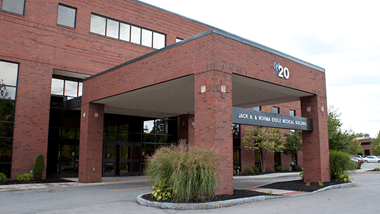Relieving Pain, Renewing Hope.
Pain is one of the most common and debilitating symptoms of cancer, with an estimated 50% prevalence among people being treated for cancer and long-term survivors. Cancer-related pain can be a result of treatment, the disease itself, or a combination of the two—and can vary in duration from short-term to long after treatment ends.
Since each person’s cancer pain is unique, pain management requires an individualized plan of treatment. The goal of Rochester Regional Health’s Cancer Pain & Rehabilitation Program is to improve each patient’s quality of life, minimize pain, and effectively manage side effects from cancer treatment.
Call Us Today: (585) 723-7705
Managing Cancer-Related Pain
The Cancer Pain and Rehabilitation Program at Rochester Regional Health is designed to help you manage your pain through all stages of the disease. The pain may change over time, but with a personalized pain management plan, our specialists can adjust your treatment at any point to meet your individual needs.
Cancer Pain Assessment
Different types of pain respond differently to treatment options which is why an accurate diagnosis of the cause and type of pain is key to finding the most effective treatment. Our specialists assess a number of factors, including:
- The location of the pain
- The severity of the pain
- The type of pain – such as sharp, tingling or aching
- Whether the pain is persistent, or comes and goes
- What activities or events make the pain worse
- What activities or events make the pain better
- Current medications you are taking
- How much your current medications ease the pain
- The impact the pain has on lifestyle, such as poor quality of sleep or loss of appetite.
Cancer-related pain can change over time, depending on the stage of the disease, and will be routinely assessed to ensure it’s being managed effectively.
Cancer Pain Management
Oral pain medications are often the first path doctors and patients choose to manage pain. Yet many cancer patients experience compromising side effects like nausea, drowsiness, fatigue, and depression. The pain specialists in our Cancer Pain and Rehabilitation Program are well versed at alternative ways to help reduce and alleviate cancer-related pain without the need to take oral medication. These include:
- Neuro-modulation – the placement of a tiny device with electrodes (small wires) directly around either the nerves or spinal cord, to block the pain signals originating at the cancer site. These precisely placed wires connect to a small, pacemaker-like battery pack (pulse generator), which generates low-voltage electrical current pulses to produce a sensation of vibration in the area of the pain. This sensation overrides the pain signal and thereby reduces pain recognition by the brain. This type of therapy is particularly useful for painful neuropathies associated with radiation, surgery or chemotherapy.
- Chemical/neurolytic nerve blocks – under ultrasound or x-ray guidance, a series of injections containing a local anesthetic, dehydrated ethyl alcohol, or phenol are administered around a nerve to safely block or destroy the nerve to eliminate the pain signal. This type of treatment is best for stubborn pain from head and neck cancers, abdominal cancers, thoracic cancers and pelvic cancers.
- Patient-controlled intrathecal analgesia – using x-ray guidance, a catheter is inserted directly into the patient’s spinal canal and connects it to a pump reservoir, which the patient can use to administer a pre-programmed dose of pain medication when he or she feels pain. By delivering medicine directly to the nerves causing pain, less medication may be needed. For many people, this can mean better pain relief with fewer side effects.
Complementary Pain Therapies
As part of our comprehensive approach to pain management, our program addresses more than just the physical effects of cancer-related pain, but its impact on your social and mental well-being.
For many patients, various therapies, along with holistic support, have proven to be effective in addressing the underlying issues that can contribute to your overall discomfort. The cancer pain program encourages patients to combine traditional medicine with complementary therapies such as:

